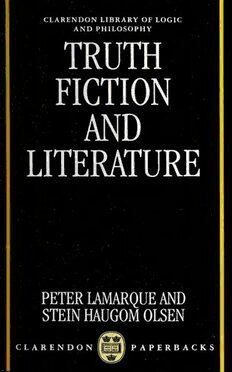
Truth, Fiction, and Literature: A Philosophical Perspective (Clarendon Library of Logic and Philosophy) PDF
498 Pages·1997·7.63 MB·English
Most books are stored in the elastic cloud where traffic is expensive. For this reason, we have a limit on daily download.
Preview Truth, Fiction, and Literature: A Philosophical Perspective (Clarendon Library of Logic and Philosophy)
Description:
This book examines the complex and varied ways in which fictions relate to the real world, and offers a precise account of how imaginative works of literature can use fictional content to explore matters of universal human interest. While rejecting the traditional view that literature is important for the truths that it imparts, the authors also reject attempts to cut literature off altogether from real human concerns. Their detailed account of fictionality, mimesis, and cognitive value, founded on the methods of analytical philosophy, restores to literature its distinctive status among cultural practices. The authors also explore metaphysical and skeptical views, prevalent in modern thought, according to which the world Ptself is a kind of fiction, and truth no more than a social construct. They identify different conceptions of fiction in science, logic, epistemology, and make-believe, and thereby challenge the idea that discourse per se is fictional and that different modesof discourse are at root indistinguishable. They offer rigorous analyses of the roles of narrative, imagination, metaphor, and "making" in human thought processes. Both in their methods and in their conclusions, Lamarque and Olsen aim to restore rigor and clarity to debates about the values of literature, and to provide new, philosophically sound foundations for a genuine change of direction in literary theorizing.
See more
The list of books you might like
Most books are stored in the elastic cloud where traffic is expensive. For this reason, we have a limit on daily download.
